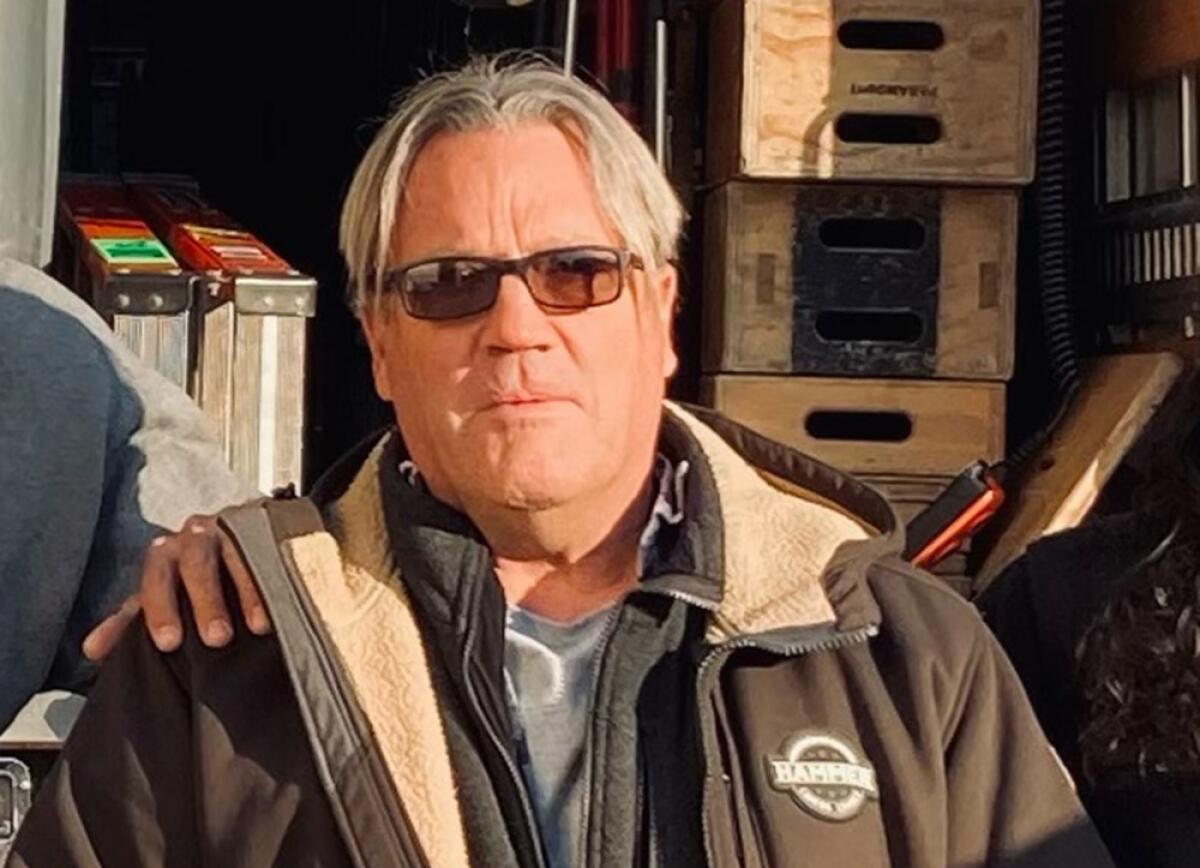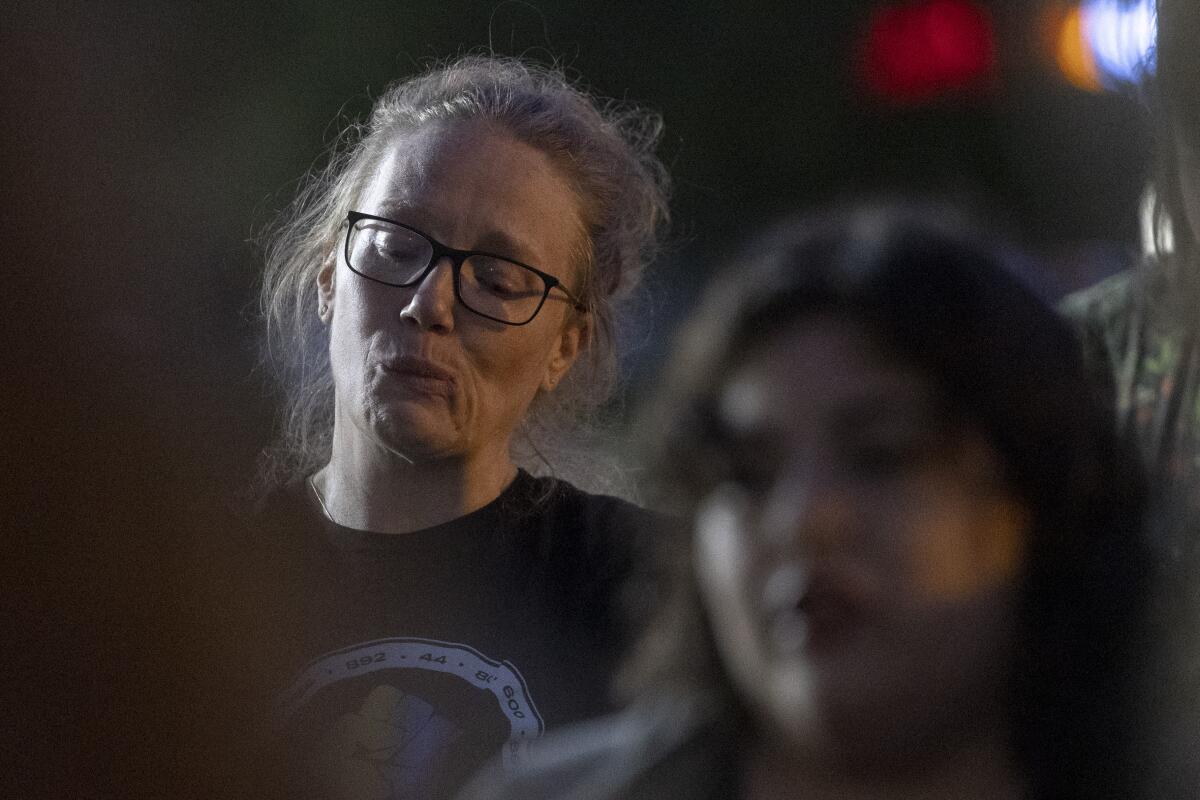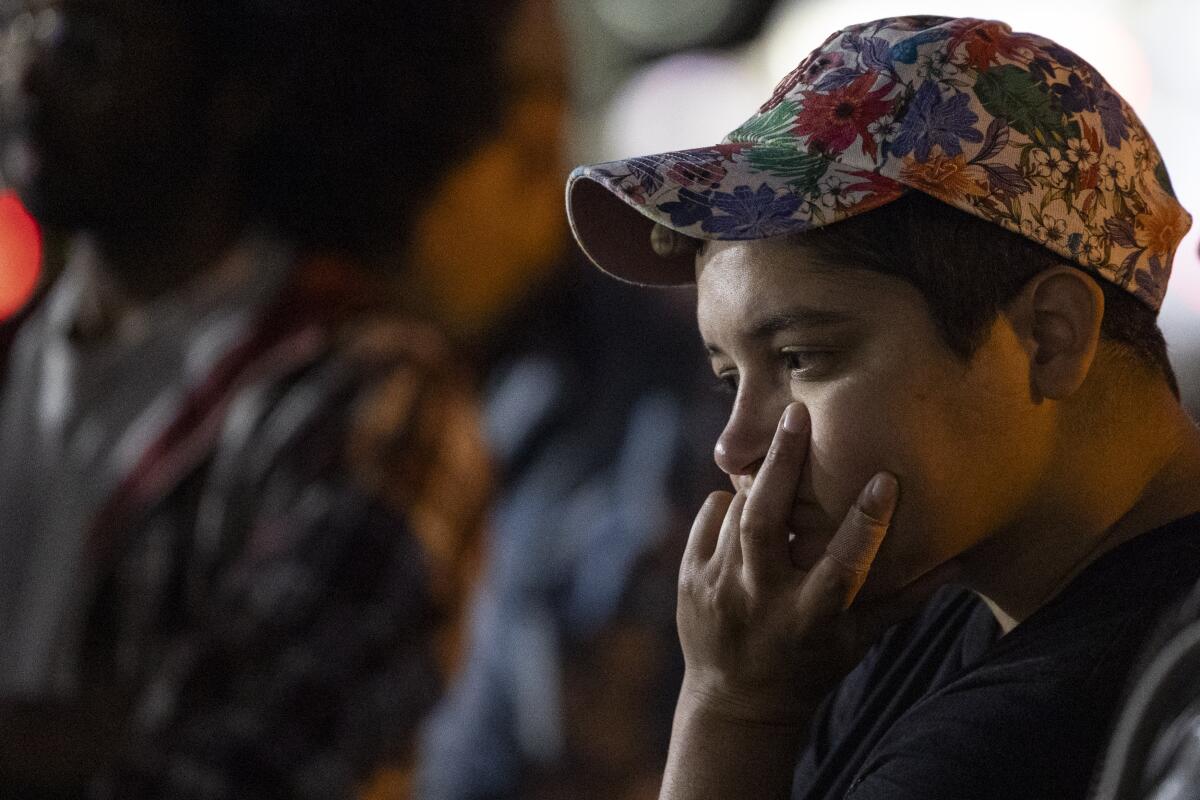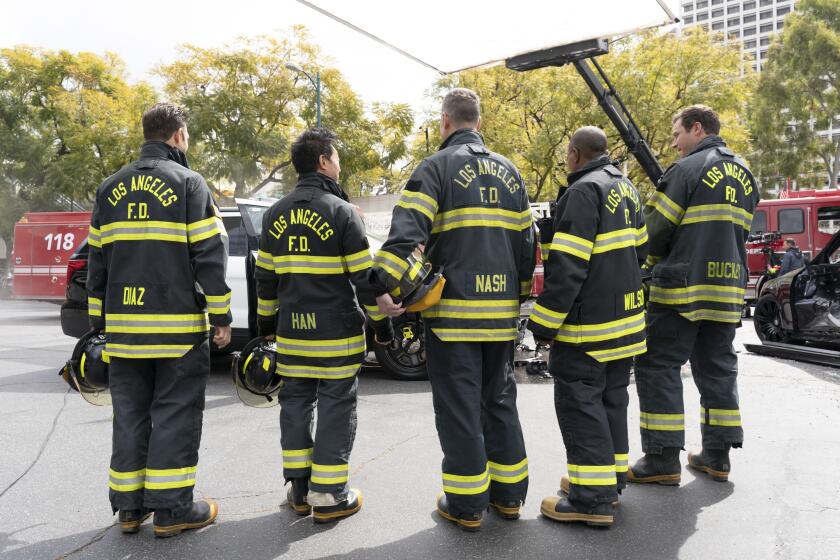Film and TV crews protest long hours, overnight shifts. ‘We are dying to entertain people’

- Share via
Gathered around a table stacked with battery-operated candles inside plastic cups, Hollywood crew members traded memories of their late colleagues and vented about their working conditions.
When a property assistant posed the question, “How many of you have had a near-miss driving home from work?” the hands of every person in the Burbank parking lot sprang up.
Dozens of below-the-line workers participated last month in an intimate vigil honoring the lives of “9-1-1” studio grip Rico Priem, “Wonder Man” lighting technician J.C. “Spike” Osorio, “Rust” cinematographer Halyna Hutchins and other crew members who have died in work-related incidents.
When Priem, 66, died on the freeway after pulling two 14-hour overnight shifts in a row on the Pomona set of the TV series “9-1-1” in May, a common refrain among crew members became, “That could’ve been any of us.”
“We are dying to entertain people,” Lisa Gardner — a costumer whose credits include Disney’s live-action remake of “Mulan” and “Hocus Pocus 2” — said at the vigil. “It doesn’t have to be that way.”
A longtime and beloved studio grip died early Saturday in a car accident after pulling a 14-hour overnight shift on the TV series ‘9-1-1.’
The circumstances surrounding Priem’s death — the marathon shooting schedule that led to his driving home at 4:30 a.m. on a Saturday — has struck a nerve among the tight-knit community of Hollywood craftspeople who long have expressed concerns about the number of hours they are expected to work per day, often deep into the night.
“No one should be put in unsafe circumstances while trying to earn a living,” said Sean Miller, a spokesperson for the International Alliance of Theatrical Stage Employees union, which represents film crews.
The Alliance of Motion Picture and Television Producers, which negotiates labor contracts on behalf of the major studios, said in a statement that “the safety and well-being of our employees has always been our top priority, which is why we have a long history of collaborating with our union partners to improve the protections in place for workers on longer shifts.”

Film and TV workers have been through a lot in recent years — from widespread production shutdowns spurred by the pandemic and back-to-back labor strikes to mass unemployment and mental health crises exacerbated by an ongoing industry contraction.
“The weight of processing grief, the deaths, the injuries is so heavy, it’s nearly indescribable,” said vigil participant Nina Moskol, a studio grip who has worked on “Deadwood” and “The Purge: Anarchy.” “It’s the entire industry. The mood is so heavy right now.”
The issue of lengthy workdays for crew members has been debated for decades.

Subscribers get exclusive access to this story
We’re offering L.A. Times subscribers special access to our best journalism. Thank you for your support.
Explore more Subscriber Exclusive content.
After “Pleasantville” cameraman Brent Hershman pulled a 19-hour shift, fell asleep at the wheel and died in a car crash in 1997, his co-workers drafted a petition to cap film and TV shoots at 14 hours. Dubbed Brent’s Rule, the proposal was never widely adopted.
“That galvanization lasted five minutes,” said Roderick E. Stevens, who co-founded the nonprofit organization 12on12off with fellow cinematographer and “Who Needs Sleep?” director Haskell Wexler.
“Very quickly it was back to business as usual.”
Historically, the movement has been met with resistance from some crew members who say they depend on overtime to pay the bills and/or qualify for health insurance through their union. Stevens said he and Wexler “got a fair amount of grief” while trying to recruit people to their cause in the early 2000s.
“There’s that mentality of, ‘If you can’t stand the heat, get out of the kitchen,’” he said.
One of Hollywood’s legendary cinematographers, Haskell Wexler wants to awaken the industry to the problem of sleep deprivation plaguing its crews.
More recently, though, Stevens has heard from colleagues pushing for even shorter workdays.
“This was launched when we were fighting to get it down to 12 hours,” he said. “If you guys can get it down to lower than that, that’s even better.”
The cause of Priem’s death, according to the Los Angeles County medical examiner, was sudden cardiac dysfunction related to a heart condition that can impair the organ’s ability to pump blood. The medical examiner declined to comment further.
It’s not clear what role Priem’s rigorous work schedule played in his death. But Aric Prather, a psychiatry professor at UC San Francisco whose research focuses on the effects of sleep deprivation, said insufficient sleep is associated with “increased risk for a variety of cardiovascular health outcomes,” such as hypertension, atherosclerosis and heart attacks.
“There’s a good reason to think that the stress of the job and ... these tough hours — probably in combination with his existing cardiovascular health — potentially put [Priem] at greater risk of having this kind of event,” Prather added.
Disney, which owns “9-1-1” network ABC, declined to comment.
Film set workers say they take desperate measures to stay awake while driving home after long shifts, such as screaming, blasting music, pulling their hair and guzzling water.
“People are waking up to the value of their lives” and deciding that “this isn’t worth it,” said vigil organizer Dan Vetanovetz, a fixtures lighting technician whose resume includes Disney’s “The Mandalorian” and HBO’s “Westworld.”
The industry: Backers of a plan to limit the workday to 14 hours want studios to honor it on Friday, but so far there’s no official backing from labor or management.
Moskol, who worked alongside Priem on “9-1-1” the week he died, said that he seemed “absolutely normal” and “sharp” as ever before his accident. She noted, however, that such a physically and mentally demanding job can take a cumulative toll.
“I think about a person of Rico’s experience and Rico’s age ... a 30-year career or longer of nearly every Friday having to work nights when you’re in production,” she said. “This shift work ... is really punishing.”
The enduring issue of long, irregular work hours played a key role in below-the-line workers’ recent contract negotiations with the major Hollywood studios.
“Everyone’s finding their way to deal with the grief, whether it’s through anger or activism or advocacy for change,” said Greg Reeves, business representative for IATSE Local 728.
IATSE, the union advocating for Hollywood crew members, and the AMPTP, which represents the top studios, have reached a tentative agreement on a new three-year contract.
IATSE and AMPTP reached a tentative agreement entitling hourly employees to triple pay whenever a workday exceeds 15 hours and on-call employees to double pay on the seventh consecutive workday.
“They should know that they’re going to have to pay to play,” said Lindsay Dougherty of Teamsters Local 399, which represents drivers, electricians, location managers and animal handlers.
She said that some Teamsters drivers worked 21-hour shifts the day Priem died. Studios, she added, “will not film as many hours if they know it’s going to cost them more money.”
The AMPTP said: “We look forward to continuing our discussions and working closely with the Hollywood Basic Crafts on this issue,” referring to the coalition of unions that includes Teamsters Local 399.
Hollywood: Working overtime is a fact of life on television and movie sets, but a petition asking for a 14-hour workday has already attracted more than 10,000 signatures.

The new IATSE contract also requires producers to pay up front for rides and nearby lodging for crews whose workdays surpass 14 hours while shooting in the Los Angeles studio zone or secondary studio zone.
The studio zone refers to a 30-mile radius where local crews are regularly expected to report to work. The secondary zone extends out another 10 miles.
The updated terms come nearly three years after camera crew members walked off the New Mexico set of the Alec Baldwin western movie “Rust” to protest what they deemed safety concerns, including inadequate overnight accommodations. Baldwin is on trial in Santa Fe for involuntary manslaughter for his role in Hutchins’ accidental shooting. He has pleaded not guilty to a felony charge of involuntary manslaughter.
Shortly before Hutchins was killed with a prop gun on set, line producers and camera crew members had wrangled over workers’ lodging arrangements in Santa Fe.
“It’s standard procedure at this point for me not to assume they’re going to offer [accommodations] and probably not to ask,” Vetanovetz said. “We’re all technically freelancers. Nobody wants to complain too loudly.”
Part of the problem for the “Rust” workers was that many of them lived in Albuquerque, more than 50 miles away from set.
Priem had to travel a similar distance to the set of “9-1-1” in Pomona, a designated “secondary” location outside the main studio zone, from his home in Woodland Hills.
When Priem was working what would be his final job, he was ready to retire, family members said. He was looking forward to passing 30-plus years’ worth of industry wisdom down to his nephew, who had just embarked on his own entertainment career.
“That’s the way he was,” said Priem’s sister Karen Priem. “His heart was so big that he took care of everybody and made sure they were happy and safe. ... He was a good person, and his life was cut too short.”
Times staff writer Meg James contributed to this report.
Sign up for This Evening's Big Stories
Catch up on the day with the 7 biggest L.A. Times stories in your inbox every weekday evening.
You may occasionally receive promotional content from the Los Angeles Times.
More to Read
Sign up for This Evening's Big Stories
Catch up on the day with the 7 biggest L.A. Times stories in your inbox every weekday evening.
You may occasionally receive promotional content from the Los Angeles Times.













